Grammar schools: What are they and why are they controversial?
- Published
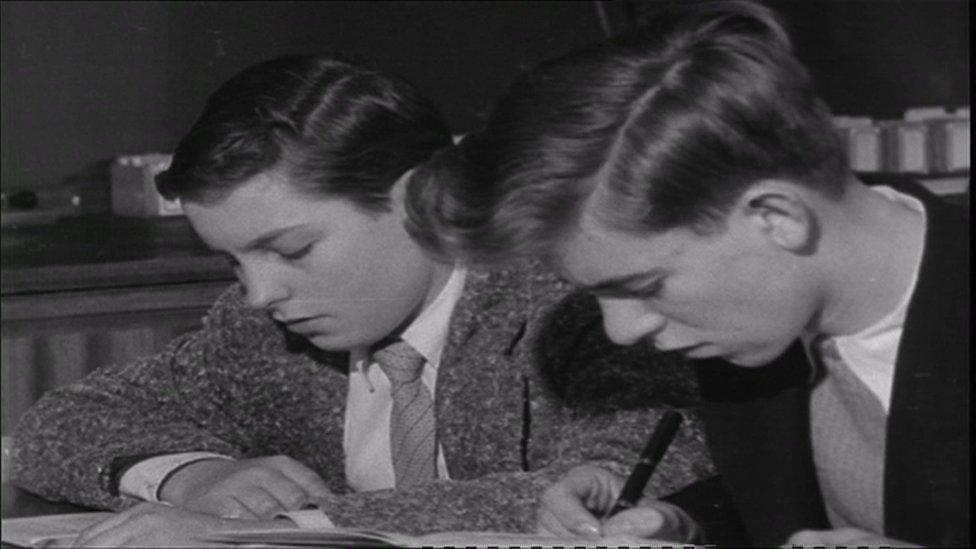
BBC News answers some of the key questions about grammar schools and poses some 11-plus questions for readers to tackle.

What is a grammar school?
Grammar schools are state secondary schools that select their pupils by means of an examination taken by children at age 11, known as the "11-plus".
There are only about 163 grammar schools in England, out of some 3,000 state secondaries, and a further 69 grammar schools in Northern Ireland.
Under the grammar school system, pupils who pass the exam can go to the local grammar, while those who do not go to the local "secondary modern school".
More common across the UK is the "comprehensive" system, in which pupils of all abilities and aptitudes are taught together.
There are no state grammars in Wales or Scotland, and although some retain the name "grammar school", they are non-selective and have no special status.

When were they first introduced?
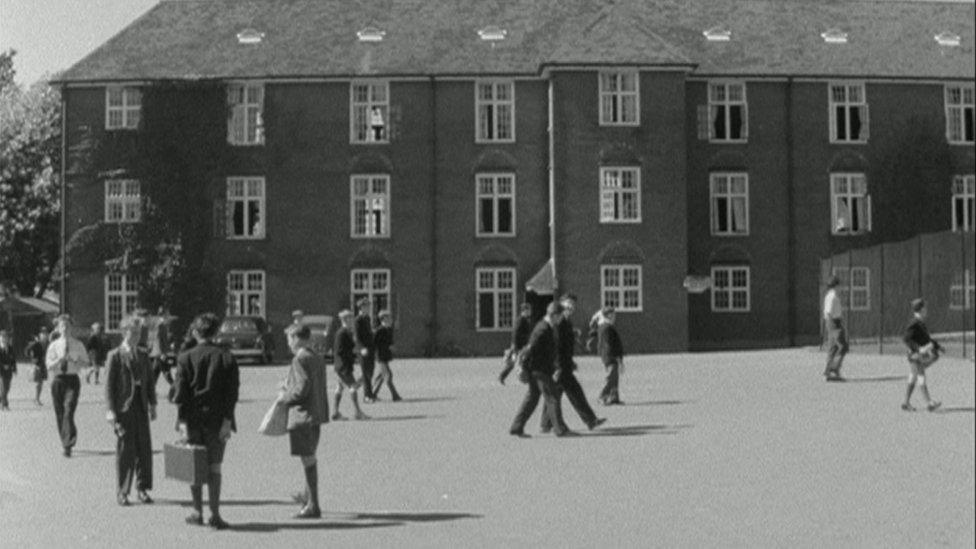
Brighton, Hove and Sussex Grammar School as seen in 1959
Grammar schools have existed since the 16th Century, but the modern grammar school concept dates back to the Education Act 1944. This made secondary education after the age of 14 free.
At the same time secondary education was reorganised into two basic types:
grammar schools, which focused on academic studies, with the assumption that many of their pupils would go on to higher education
secondary modern schools, which were intended for children who would be going into trades
There was a third type of school, the technical school - but very few were established.
So the system effectively divided pupils into two types - those destined for university and better jobs, and those deemed more suitable for less celebrated professions.

Why did the system change?
During the 1950s and 1960s, it was said, mainly by Labour politicians and egalitarian educationalists, that the selective education system reinforced class division and middle-class privilege.
In 1965, the government ordered local education authorities to start phasing out grammar schools and secondary moderns, and replace them with a comprehensive system.
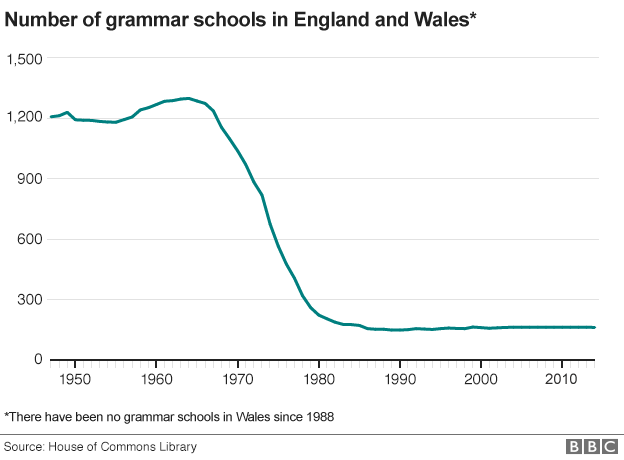
The quickest changes were made in Labour-controlled areas, while strongly Conservative counties moved slowly or not at all.
A handful of counties and local authorities in England have kept largely selective schools systems, including Kent, Medway, Buckinghamshire and Lincolnshire, while others such as Gloucestershire, Trafford and Slough have a mix.
In other places, a few grammar schools survived in areas that were otherwise fully comprehensive, such as Birmingham, Bournemouth and some London boroughs.
In 1998, Labour's School Standards and Framework Act forbade the establishment of any new all-selective schools.
It also made provisions for local ballots on the future of existing grammar schools.
Only one such ballot has taken place since then. In 2000, parents in Ripon, North Yorkshire, voted by 67% to 33% in favour of keeping Ripon Grammar as a grammar school.

How do grammar schools select their pupils?
Grammar schools select their pupils by means of a test, known as the 11-plus, which is taken by pupils in the last year of primary school.
It is designed to see if they are able enough to learn in a grammar school environment with peers of a similar standard.
But many complain about the nature of the test, as it often features types of questions not usually adopted in regular state primaries.
Grammar school entrance exams can consist of all or a subset of the following:
• Numerical reasoning (maths)
• Verbal reasoning
• English comprehension, punctuation and grammar
• Non-verbal reasoning
• Creative writing
They have traditionally used questions based on verbal reasoning and non-verbal reasoning, and it is argued that those who have been intensively tutored tend to do much better in these tests.
Recently there have been attempts to make the tests more accessible and closer to the kind of word problems children face in primary schools.
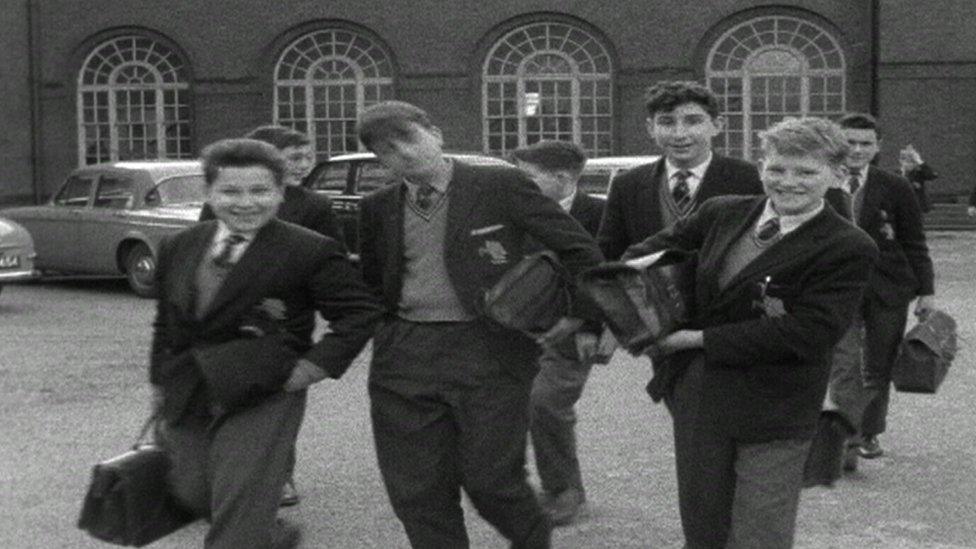
These boys attended a grammar school in Manchester in 1961
Some grammar schools admit successful students by ranked order - all candidates are ranked by their 11-plus score - literally creaming the best pupils off the top.
In other areas, pupils who pass the test are then ranked by admission criteria, which can include the distance they live from the school or whether they already have a sibling there.
There are numerous companies that offer specialist 11-plus tutoring to children from an early age.

Some examples of 11-plus questions (Answers at foot of page)
Marco, Laura, Peter, Ben and Sally are out shopping for jackets. Ben and Laura want waterproof jackets, Peter and Sally want brightly coloured jackets with hoods, Laura and Marco want lightweight jackets and Marco and Ben want brightly coloured jackets but with a warm lining.
Out of the following statements, which one must be true? Write your answer in the answer box below.
A. Sally and Peter want different types of jackets.
B. Only two people do not want brightly coloured jackets.
C. No one wants a lightweight jacket with a hood.
D. Sally wants a coat with a hood and a warm lining.
E. Four of them do not want waterproofs.


Identify which, if any, of the above shapes have been rotated to form the shape below.
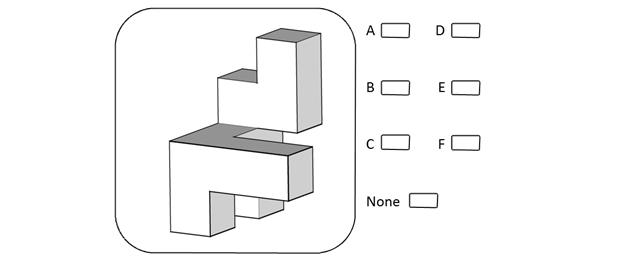

Select the option (A, B, C or D) which has the sentence with the most suitable grammar
A. Was it he whom had a house burn down?
B. Was it he whose house burnt down?
C. Was it he that had a house burn down?
D. Was it he who's house burnt down?
Sample questions reproduced with the kind permission of ElevenPlusExams.co.uk



Where do the main political parties stand on grammar schools?
Labour oppose the creation of more grammar schools saying that instead of improving equality, they make it worse.
The Conservatives Party support for grammar schools was lukewarm under previous Prime Minister David Cameron, but its manifesto states it will allow all good schools to expand "whether they are maintained schools, academies, free schools or grammar schools".
The Liberal Democrats would maintain the status quo, not opening any more or closing any existing ones.

Quiz answers (in order of question appearance) C, E, B
- Published15 October 2015
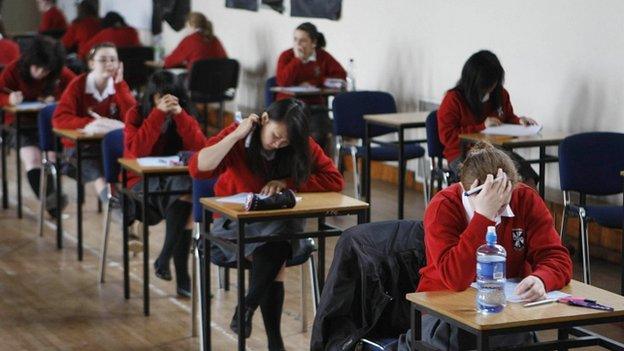
- Published15 October 2015
- Published15 October 2015